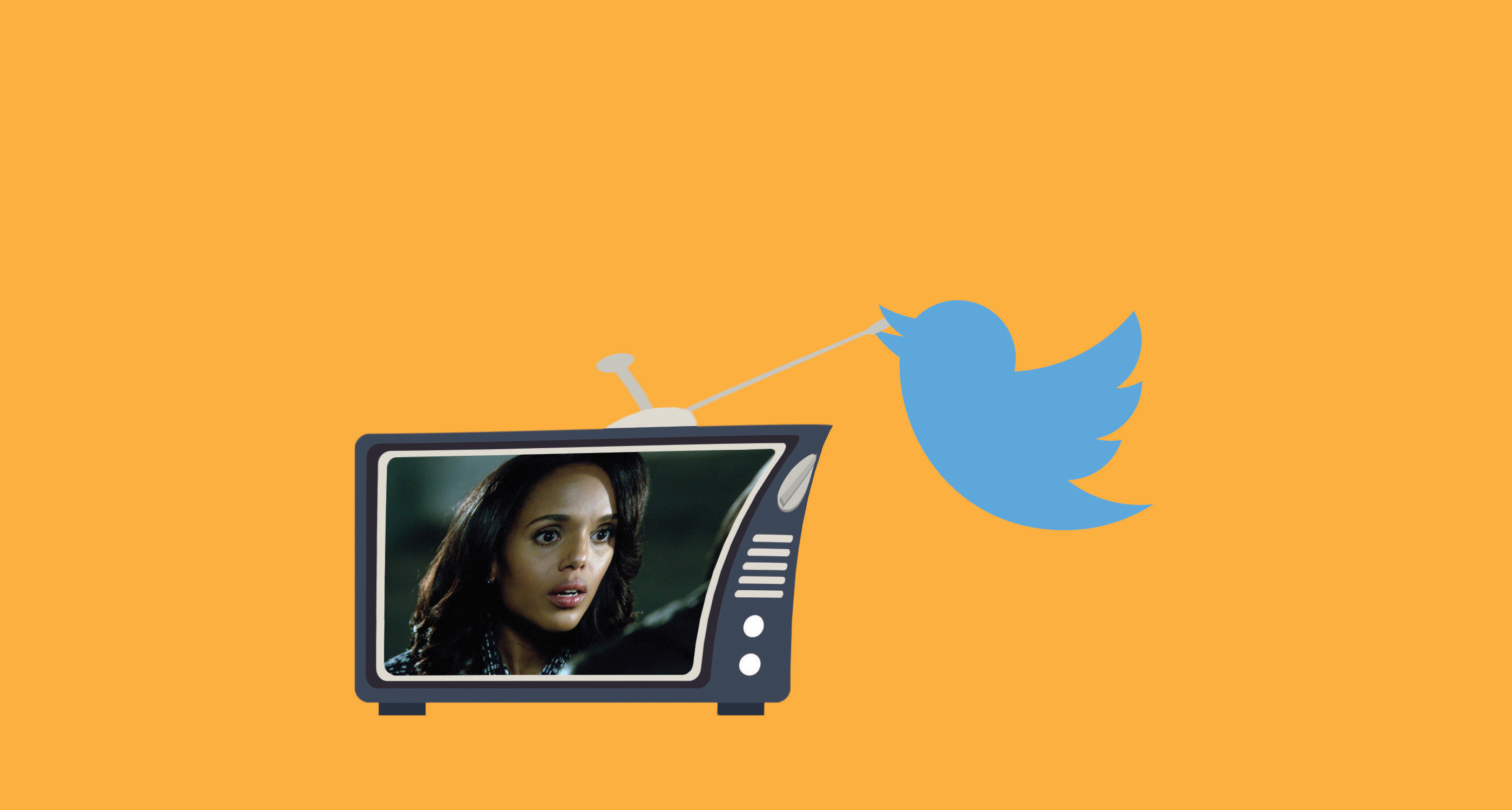How Twitter is warping your favorite TV shows
Network executives are increasingly obsessed with Twitter buzz — but it comes at a heavy creative price


A free daily email with the biggest news stories of the day – and the best features from TheWeek.com
You are now subscribed
Your newsletter sign-up was successful
The rise of social media has fundamentally altered the way viewers interact with shows. For decades, the only way a fan could express love for a TV show was through a P.O. Box. Now, fans can directly reach showrunners, writers, producers, and actors in the split-second it takes to send a tweet.
Twitter is here, and it's not going away. Whether this newfound accessibility helps or hurts television remains an open question, one that largely rests on how TV's Powers That Be use this new tool.
Will the increased fan engagement help the quality of programming, and give fans a bigger voice in what networks will program? Or will it have the opposite effect by warping the creative process — and even the act of watching the show — in favor of pandering?
The Week
Escape your echo chamber. Get the facts behind the news, plus analysis from multiple perspectives.

Sign up for The Week's Free Newsletters
From our morning news briefing to a weekly Good News Newsletter, get the best of The Week delivered directly to your inbox.
From our morning news briefing to a weekly Good News Newsletter, get the best of The Week delivered directly to your inbox.
At the very least, this much is now true: A show's survival is now directly connected to its Twitter presence. In 2013, Nielsen, which has measured TV audiences since 1950, updated its ratings model to include Twitter TV ratings. The system measures the TV-related conversations occurring on Twitter, encompassing not only the messages and hashtags pegged to a show, but the total reach of the tweets.
The unintentional side effect is tremendous pressure on showrunners to create new, tweet-driving TV moments. Shows that often hinge on sudden twists and dramatic moments, like Scandal and The Walking Dead, have developed a passionate Twitter base, becoming the top tweeted-about shows in 2015. Pretty Little Liars — another show known for its social media savvy fan base — aired its mystery-revealing season finale and yielded a whopping 4.5 million tweets. These moments don't just increase the buzz of a show, or the "Twitter TV ratings." They increase the actual ratings, as viewers who want to share the group-watching experience — and avoid being spoiled — tune in to watch live when they see a tweetstorm in progress.
Once a novelty, ranking as a "trending topic" is increasingly seen as crucial to survival in this competitive TV landscape. "People are planning [Twitter engagement] from the moment they start writing the show," said Andrew Adashek, who manages Twitter's TV partnerships, at a Variety panel discussion. "When they're shooting, they're capturing things ahead of time — and knowing that in six months or a year, that they are going to need that content to help bring the audience in."
This is the moment when the snake eats its own tail, and it should give TV purists pause. If writers are building their shows around moments designed to generate shock and buzz on social media, how long until smart, level-headed creative choices give way to shoehorned twists and social-friendly stories — regardless of whether they're organic to the plot?
A free daily email with the biggest news stories of the day – and the best features from TheWeek.com
For their part, network executives are already eager to embrace this new metric. "To be a network at this moment in time, it is part television and part social," the president of ABC Family Network told The Wrap. Nigel Cox-Hagen, the network's senior vice president of marketing, creative, and branding, agreed. "Our purpose on social is to be responsive to the fans," he said. "Our approach is responsive marketing. When we see interest in our show or around a particular cast member, we know to pick up on it and to feed that interest."
Of course, not every show is being produced with Twitter in mind, and many creators are actively working to avoid being influenced by fan chatter. "One thing I definitely don't do is look to connect to any social media or articles or commentary in a prescriptive way as in, 'We should add X,'"House of Cards showrunner Beau Willimon told The Observer. "That has to be a discovery, and to approach it in any other way is pandering or schematic. We have to do exactly the opposite of what the audience is expecting."
In many cases, networks are even pushing stars to increase buzz by tweeting during episodes — encouraging audiences to look away from the screen where the show is playing, and toward the smaller screen they have in their hands. Though shows like MTV's Teen Wolf, CBS's Scorpion, and ABC's Agents of S.H.I.E.L.D. have employed this strategy, some actors are pushing back. In an interview with Vanity Fair, Battle Creek star Dean Winters revealed that he rejected CBS's request to live-tweet each episode. "If you're live-tweeting during the show, you're asking the people to get rid of their suspension of disbelief and now I'm talking to them as Dean Winters while I'm trying to get them to believe in me as Russ Agnew," he said. "I think it's disrespectful to the craft. For the most part it's disrespectful to the audience."
Battle Creek has since been canceled. Would Dean Winters' tweets have made a difference? Maybe not — but in the future, network executives might not give him a choice.
Alice Walker writes about arts, entertainment and culture. She contributes regularly for Over The Moon, Elite Daily, and Bustle, where she is a weekly television columnist.
-
 Health insurance: Premiums soar as ACA subsidies end
Health insurance: Premiums soar as ACA subsidies endFeature 1.4 million people have dropped coverage
-
 Anthropic: AI triggers the ‘SaaSpocalypse’
Anthropic: AI triggers the ‘SaaSpocalypse’Feature A grim reaper for software services?
-
 NIH director Bhattacharya tapped as acting CDC head
NIH director Bhattacharya tapped as acting CDC headSpeed Read Jay Bhattacharya, a critic of the CDC’s Covid-19 response, will now lead the Centers for Disease Control and Prevention
-
 Walter Isaacson's 'Elon Musk' can 'scarcely contain its subject'
Walter Isaacson's 'Elon Musk' can 'scarcely contain its subject'The latest biography on the elusive tech mogul is causing a stir among critics
-
 Welcome to the new TheWeek.com!
Welcome to the new TheWeek.com!The Explainer Please allow us to reintroduce ourselves
-
 The Oscars finale was a heartless disaster
The Oscars finale was a heartless disasterThe Explainer A calculated attempt at emotional manipulation goes very wrong
-
 Most awkward awards show ever?
Most awkward awards show ever?The Explainer The best, worst, and most shocking moments from a chaotic Golden Globes
-
 The possible silver lining to the Warner Bros. deal
The possible silver lining to the Warner Bros. dealThe Explainer Could what's terrible for theaters be good for creators?
-
 Jeffrey Wright is the new 'narrator voice'
Jeffrey Wright is the new 'narrator voice'The Explainer Move over, Sam Elliott and Morgan Freeman
-
 This week's literary events are the biggest award shows of 2020
This week's literary events are the biggest award shows of 2020feature So long, Oscar. Hello, Booker.
-
 What She Dies Tomorrow can teach us about our unshakable obsession with mortality
What She Dies Tomorrow can teach us about our unshakable obsession with mortalityThe Explainer This film isn't about the pandemic. But it can help viewers confront their fears about death.
